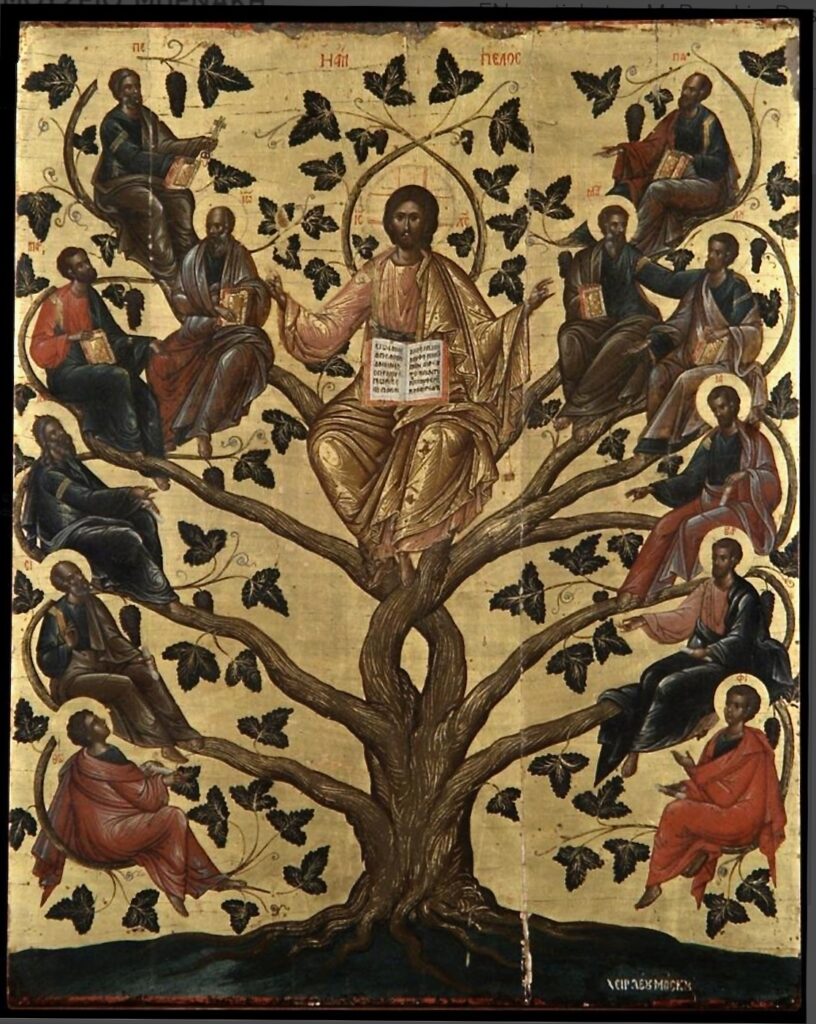“I am the true vine.” So, why the adjective? Why does our Lord describe Himself as the true vine? Why not just “the vine,” as in fact He says later? Well, for starters, to make sure we get the analogy right. Because we often get it wrong.
We typically think that when our Lord describes Himself in earthly terms – like a shepherd, bread, light, or a vine – that the true versions are down here below and He’s like them. In fact, it’s the opposite. The things of this world, while real, are just images of the surpassing reality of eternal life – “the life that is life indeed.” (1 Timothy 6:19) Jesus is truer than any shepherd in this world, more nourishing than any bread, and brighter than any light. Indeed, it’s not just that He’s greater than these earthly realities, but that they derive their meaning from Him.
The worst example of such mis-analogizing came from an enthusiastic speaker on matrimony who once told a group of engaged couples, “The Bible compares the relationship between Christ and the Church to marriage!” No, it’s just the opposite – and all the better because of that. The relationship between Christ and the Church is the true marriage. Every marriage here is an image of it, a greater or lesser likeness.
So, our Lord says “I am the true vine” to keep us from thinking that He is merely like a vine. It’s not that there are vines in this world, and He is like them. It’s rather that He is the only true vine while the vines of this world are shadows or images of Him. Which means that the various qualities we see in earthly vines we find perfectly – surpassingly – in the divine vine that is Christ.
One such quality is the union of vine and branches. They are united to one another not legally or morally, but organically. The same sap and vitality coursing through the vine flows also through the branches. Even more so for our relationship with Christ. “I am the vine, you are the branches.” Our union with Him is not a mere legal relationship by which He commands, and we obey. Nor is it only a moral relationship by which we agree with Him. No, we obey and agree as a result of our union with Him. We cannot disobey or defy Him any more than a branch could do to the vine.
This union means that Christ’s relationship with us is not merely external, as if He’s outside of us and sort of moving us around like pieces on a chess board. No, He dwells in us even more profoundly than the vine’s life dwells and animates the branches. He moves us even more surely than a vine grows and bears fruit through its branches. And our relationship is not an occasional one, as if we can just touch base and check in with Him now and then. We must be in constant contact with Him – even more than branches with the vine.

An aspect that perhaps we don’t want to consider is that the branches share in the pruning of the vine. There’s a saying: “Stressed vines make the best wines.” The vine that is stressed by being pruned back and watered little (just enough) produces better grapes and better wine. Of course, no vine has been so stressed or pruned back as our Lord Himself. And no vine has ever made such great fruit and wine.
By way of their oneness with the vine, the branches must be stressed as well. “[M]y Father is the vine grower. He takes away every branch in me that does not bear fruit, and every one that does he prunes so that it bears more fruit.” Deeper union with the vine requires a deeper share in His being pruned. We are “joint heirs with Christ, if only we suffer with him so that we may also be glorified with him.” (Romans 8:17) Being pruned – stressed – is no fun. The mystery can only be lived in union with the vine, who alone makes our pruning fruitful.
I am the true vine. The adjective is there for another reason. He is the true vine in contrast to false vines. The world offers us plenty of false vines – those ideas that promise life and nourishment but bring barrenness and death instead. One false vine promises life and nourishment through material abundance; that fulfillment comes from what we possess, from things rather than persons. Another promises life through power: we prosper and grow to the degree that we have control. Or the false vine of unlimited freedom: we are alive to the degree that we can do whatever we want.
Forgetting or outright forsaking the true vine, we foolishly attach ourselves to these false vines. And we might even last for a time. But they ultimately prove not just sterile, but fatal for us.
I am the true vine. Our Lord’s words present a twofold challenge. First, to put on a fresh spiritual way of thinking and see the world from His perspective – and not Him from the world’s. He is the vine to which all others point. Second, the challenge to detach from false vines and choose Him instead. That requires the willingness to reject the world’s promises and be pruned with Him for greater fruitfulness.
__________















